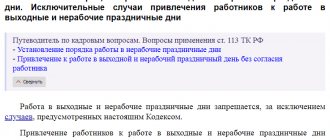Text of Article 3 of the Labor Code of the Russian Federation in the new edition.
Everyone has equal opportunities to exercise their labor rights. No one can be limited in labor rights and freedoms or receive any advantages depending on gender, race, skin color, nationality, language, origin, property, family, social and official status, age, place of residence, attitude to religion, beliefs, membership or non-membership in public associations or any social groups, as well as other circumstances not related to the employee’s business qualities. Establishing differences, exceptions, preferences, as well as restricting the rights of workers that are determined by the requirements specific to this type of labor established by federal law, or due to the special care of the state for persons in need of increased social and legal protection, or established by this Code or in cases and in the manner that they provide, in order to ensure national security, maintain an optimal balance of labor resources, promote, as a matter of priority, the employment of citizens of the Russian Federation and in order to solve other problems of the domestic and foreign policy of the state.
Persons who believe that they have been discriminated against in the world of work have the right to apply to the court for restoration of violated rights, compensation for material damage and compensation for moral damage.
N 197-FZ, Labor Code of the Russian Federation, current edition.
The concept of discrimination in the world of work
Employment discrimination means treating people differently in the world of work because of characteristics that make them different from others that have nothing to do with merit or performance. For example, religion, skin color, race, gender and more.
The Labor Code does not contain a complete list of discriminatory circumstances, but in addition to those listed above, these include origin, property, family, social status, official position, age, place of residence, beliefs, non-membership, membership in social associations, social groups. These are circumstances that are not related to the business qualities of women or men.
The Russian Federation prohibits discrimination in the world of work, but today this problem is unresolved. This means that any motive other than that specified in Article 3 of the Labor Code of the Russian Federation violates the implementation of equal opportunities in the world of work, provided that this motive does not relate to the professional qualities of the employee.
In the Russian Federation, discrimination against workers' labor rights based on place of residence is daily practice. Failure to register a place of residence cannot become an official reason for refusal to hire; in practice, this often occurs.
Where to complain about discrimination?
According to the Labor Code, persons who have been discriminated against can go to court. However, there are other options. Before moving directly to the trial, we will consider other ways to solve the problem.
Contacting the labor inspectorate
The Federal Labor Inspectorate is obliged to monitor the implementation of the labor rights of citizens, as well as the recording of such violations. That is, it will not help you resolve the conflict on an individual basis, but the fact of discrimination itself will be officially indicated.
Such an appeal will also be useful in cases where an advertisement with violations is published during the hiring process. If there are obvious signs of discrimination, then you can quite reasonably immediately contact the labor inspectorate. When such violations are recorded, Labor Inspectorate employees file a complaint with the prosecutor's office. However, you can do this yourself.
Contacting the prosecutor's office
Facts of violation of labor rights also fall under the jurisdiction of the prosecutor’s office, because this body monitors compliance with all laws, including the Labor Code of the Russian Federation. When filing a complaint with the prosecutor's office, try to present as much evidence of discrimination as possible.
Plus, you can always file a collective complaint if there are other victims. Employees of the prosecutor's office must conduct inspections, as a result of which they can issue an order for the employer to eliminate violations and restore the labor rights of citizens.
It is also worth considering the fact that the prosecutor’s office can limit itself only to recommendations on other ways to restore one’s rights. They may recommend contacting the labor inspectorate or court for compensation for the damage caused.
Appeal to the Federal Antimonopoly Service
FAS considers complaints about non-compliance with advertising laws. Job advertisements that contain discriminatory requirements are a violation of such laws. In this case, the advertisement can be placed on the Internet, print media or other media.
Trial
The most effective way to achieve justice in this matter is to go to court. Everything will depend on the subject of the dispute, of course. Therefore, you should decide on the specific actions of the employer that you are challenging. To successfully resolve the problem you will need:
- Correctly describe the violations committed;
- Correctly formulate your requirement;
- Provide good evidence (recorded facts, acts or other documents);
- Confidently defend your own position.
In order to defend your position well, you will need the participation of a qualified specialist. Remember that the law is on your side, and we will help you achieve justice. Take advantage of a free consultation on your issue right now online or order a call.
Types of discrimination in the labor sphere
There are several types of discrimination in labor law:
- Wage discrimination. This problem is familiar to the economy of every country, when workers of equal qualifications and knowledge are differentiated in wages. This often happens in market economies where there is a significant influx of labor migrants, usually men. It is against such an unprotected part of the population that discrimination is carried out. Such discriminated groups of the population include visitors against locals, women against men.
- Discrimination in hiring and firing. This type of discrimination concerns, first of all, young people with education but no work experience, disabled people, former prisoners, people of pre-retirement age and other workers.
- Discrimination in career advancement. This type applies more to women, immigrants, and national minorities. In this type of discrimination, one can separately distinguish professional segregation - the division of professions of women and men.
- Discrimination in education and training. This type of discrimination is based on material and financial differences and is latent (it is difficult to trace, because discrimination occurs unintentionally; people from low-income families are simply less likely to receive a good education).
Classification
All types of discrimination are prescribed in legislative acts. But in practice, their list is much wider.
Discriminatory criteria include:
- race;
- nationality;
- place of residence or registration;
- color of the skin;
- employee gender;
- presence or absence of children;
- family status;
- religious and political beliefs;
- gender discrimination applied to women of childbearing age;
- the language of communication;
- age;
- position and social status;
- property status.
All types of discrimination are very closely interrelated, giving rise to and reinforcing each other. This phenomenon affects different segments of the Russian population and social groups.
Article 22 of the Labor Code spells out all the rights and obligations of subordinates and superiors.
In case of violations, the disagreement can only be resolved with the help of federal inspection bodies or the court. Important: Refusal to hire or transfer to a vacant workplace must be motivated only by the professional and business qualities of the applicant.
Gender discrimination
This type of infringement of rights is called sexism or gender preference. This can apply equally to male and female genders.
Sexism can manifest itself in various areas of a person’s life and take different forms:
- refusal of employment;
- ban on education;
- humiliation in the family;
- inhibitions in career development;
- differentiation of wages;
- harassment, violence, use of brute physical force.
When looking for a new job, many advertisements contain requirements regarding the gender of the potential employee. This is where discrimination against women or men begins.
Age discrimination
It is believed that young specialists work much better. Therefore, age restrictions can cause conflicts.
This type of discrimination is also called ageism and can manifest itself in:
- denial of employment or promotion due to age;
- refusal to increase wages due to age factors;
- denial of additional training or access to opportunities to improve professional skills due to age;
- exemption from a position due to age.
People 45 and older have to deal with ageism almost every day.
Discrimination against people with disabilities based on health conditions
Citizens with disabilities are constantly faced with various restrictions in the field of employment. They are perceived only as a burden in production. This is often due to a lack of understanding of the situation of such people, their needs and capabilities.
The Russian Ministry of Labor, by Order No. 777 dated November 9, 2017, approved special recommendations for searching for signs of discrimination against people with disabilities during employment.
This document identifies 2 types of discrimination against persons with disabilities:
- Direct discrimination. A person is denied registration for a job, promotion on the career ladder, or professional guidance, and is offered only unqualified and low-paid jobs.
- Indirect discrimination. Manifests itself in an obstacle or restriction in the performance of work by a disabled person relative to other employees by creating special conditions.
Compared to other social groups, people with disabilities experience the greatest difficulties in realizing their formally equal right to work.
Attention: As judicial practice shows, restrictions on the rights of workers are not isolated cases, they are widespread and quite difficult to combat.
Racial discrimination
Discrimination under this circumstance is a complete restriction or infringement of the rights of people on the basis of race or differences in skin color.
It occurs at various stages of the labor relationship:
- apparatus employed;
- availability of jobs;
- salary amount;
- rationing of labor activity;
- promotion;
- dismissal from work and others.
Such a restriction of rights can be encountered in most states, therefore, discrimination has acquired a global scale.
Discrimination based on religion
This term means suppression of the will of people whose religion does not correspond to generally accepted canons. It manifests itself in labor relations in the same forms as the above-mentioned types of discrimination.
This problem is quite relevant in the modern world, as there are different faiths.
Other types of discrimination
Other forms of discrimination of concern to the ILO include HIV or AIDS, a woman's pregnancy, sexual orientation, the applicant's criminal record, and marital status.
What to do if there is discrimination at work? Every person deserves to be treated fairly, but often you have to fight for it. We'll look at how to do this below.
Where to complain about discrimination?
Denial of employment based on any discriminatory criterion is unlawful. Labor violators can be held accountable.
People who are confident that they have been subject to infringement have the right to file a complaint with the following authorities:
- to the prosecutor's office;
- to the judiciary;
- to FAS;
- to the labor inspectorate.
Important: In some cases, it is permissible to write two statements at the same time.
What is not discrimination
Differences in treatment or remuneration are not discrimination, but only if such differences are based on differences in labor productivity.
This is due to the fact that some professions and specialties have different productivity compared to others. Also, different levels of communication and remuneration can be explained by differences in knowledge, education, qualifications, and abilities of workers. The higher all these levels, the higher the wages. After all, the higher these levels, the higher the productivity.
It is also worth noting that on the basis of the talent, knowledge, abilities, skills of a person, no matter women or men, a professional opinion about him and, therefore, treatment is formed. Different treatment is not discriminatory. After all, this subjective assessment of a face is formed by natural differences between people.
The most important thing is that, despite being treated differently, people are provided with equal opportunities in the labor sphere to realize their professional qualities.
Then the treatment is not considered discriminatory. For example, it is not considered discrimination to treat a disabled employee specially or provide him with special machinery or tools to work. It is also not discrimination against women to refuse to work in hazardous conditions; this also applies to pregnant women. As for men, we are talking, for example, about passing a medical examination as a pilot.
Protection of certain categories of citizens
The Labor Code of the Russian Federation has norms. The purpose of which is not to discriminate, but to protect certain categories of citizens. Their purpose is to ensure labor and health protection for persons who need increased legal and social protection. The law takes into account objective differences in physical characteristics, and therefore makes restrictions on the types of work. This often applies to women in professions with difficult working conditions, and pregnant women.
These standards include rules that prohibit employment for certain types of work without a medical certificate. Or regulations that impose additional requirements for occupying a certain position. Most often these are the professions of men - pilot, driver, etc.
The legislator's special attitude is expressed in the quotas for jobs for people with disabilities.
The law of the Russian Federation additionally established that differences, as well as preferences and exceptions and restrictions on the rights of workers, are also determined by the legal status of citizens in the Russian Federation. That is, there will be a different attitude towards people who work under a quota and those who work under a work permit. Specific requirements for hiring employees - foreign citizens. They must know Russian. But this is not discrimination. This just maintains the balance of the normal functioning of the country and is not a problem.
Forms and causes of discrimination
Based on the form of discrimination, one can distinguish hidden and open. Due to the provisions of the Constitution of the Russian Federation and the Labor Code, an employer is prohibited from violating the labor rights of an employee, including for discriminatory reasons. Not wanting to be held administratively liable, employers more often resort to hidden forms of discrimination against employees.
The following signs are characteristic of a hidden form of discrimination:
- Differences in wages for representatives of a certain category of employees. Payment for the same amount of work performed may vary depending on reasons not determined by the labor and professional qualities of the employees. The employer tries to hide the difference in pay for other reasons - overtime, disciplinary action, etc.
- Complex pressure on employees. Undesirable employees may be subject to additional tests for professional suitability - interviews, testing; force them to transfer to other units, write a letter of resignation of their own free will.
- Involvement in discrimination of other persons, usually those who are subordinate to the employer - heads of sections, workshops, infrastructure directors, etc.
Employees with any qualifications are not immune from discrimination. There are unspoken preferences for professions in the labor market. In some, preference is given to young people of a certain gender in employment. Thus, when applying for employment in law enforcement agencies, security, or blue-collar jobs, the employer is more likely to give preference to a man, given an equal degree of qualifications. If it is necessary to employ a primary school teacher, secretary, or teacher, then for unspoken reasons preference is given to a woman.
Expert commentary
Kamensky Yuri
Lawyer
Similar practices have existed for decades. In a particular sector of the economy, employees of a certain gender predominate - women in the civil service, in education, the judicial system, healthcare - that is, in most areas of a service nature and requiring perseverance. Men's labor is in demand in the military, law enforcement agencies, construction, and manufacturing. Discrimination is possible even at the stage of employment - passing specialized tests and interviews.
A hidden form of discrimination manifests itself through employer pressure on an employee. Attempts are being made to force the employee to resign of his own free will. To do this, the employer may take the following illegal measures:
- Set difficult tasks and later impose penalties on the employee for failure to complete them.
- Turn his colleagues against the employee. Such actions develop into open bullying and make the employee feel isolated from the team. When bullying (bullying), methods of unfounded criticism, open humiliation, and provocation of an employee by his immediate superiors or colleagues can be used.
- Pressure on the employee. The employer may force him to transfer to a lower-paid position or agree to do the work at a reduced rate. If you refuse, the head of the enterprise or his representatives may threaten inspections and appeals to law enforcement agencies.
Discrimination at work can be linked to certain fears and phobias. Even with a loyal employer, troubles for an employee can await directly in the team. The employee, especially if he is young or inexperienced, is sometimes assigned responsibilities that are not provided for in the employment contract. Considering a young specialist to be a “weak link”, more senior colleagues believe that a younger employee is obliged to take on additional workload. This type of discrimination can be veiled by mentoring and other reasons supposedly necessary for the employee’s adaptation to the team.
Expert commentary
Gorbunova Olga
Lawyer
An employee may encounter discrimination directly during employment. The Labor Code of the Russian Federation prohibits refusing to apply for a job because of gender, race, nationality and other reasons. If a job is refused, the applicant for a vacant position may require written explanations from the employer, which must be provided within seven days from the date of the relevant requirements.
Discrimination usually involves indirect restrictions on the rights of employees. Negative consequences for employees who are not privy to departmental affairs and nuances are associated with the desire to cover up offenses or hold on to a vacant position for relatives and friends of the employer. Discriminatory processes are also influenced by the “telephone law”, which exists behind the scenes in many large commercial and government structures.
Discriminatory restrictions
The problem of separating the concept of discrimination in its pure form and restrictions of a discriminatory nature is clearly visible. If according to Art. 5.62 of the Code of Administrative Offenses of the Russian Federation, discrimination is a violation of the rights, freedoms and legitimate interests of a person depending on his gender, skin color, nationality, race, language, origin, etc., then restrictions of a discriminatory nature in the labor sphere are restrictions that entail discrimination .
Such restrictions include, for example, advertisements for hiring workers indicating age and gender. At the same time, indicating the quality of education is not considered a discriminatory restriction. It can affect work productivity. But indicating gender or marital status, or the number of children, or affiliation with a particular political party are fully discriminatory. However, this problem has not yet been resolved, despite the fact that administrative responsibility is provided for it.
Most often, discriminatory restrictions in the labor sphere are associated with certain stereotypes in people’s minds. This may be due to prejudice in the inability of people of a certain gender, education, or race to perform their work efficiently and productively, to religious intolerance. This applies to women and men of a certain age and nationality.
Discrimination in hiring – what to do?
Today, it is extremely common to see job advertisements that specify the gender, exact age, preferences and even race of the employee. That is, characteristics that have nothing to do with his business abilities. Even taking into account that this is not a fact of discrimination at work, because you are not yet an employee, such an attitude of the employer will be illegal.
According to Part 6 of Art. 25 of the Labor Code of the Russian Federation, it is prohibited to disseminate information about vacancies or available places of similar content. If a job advertisement contains information about restrictions on rights based on gender, age, race, religious beliefs and other distinctive features of social groups not related to work, then it is a violation. The only exceptions are the parameters established by federal legislation.
If you encounter discrimination during an interview, try to record this fact. You can record the dialogue using a voice recorder using your mobile phone or even on video. These materials will help you achieve justice and punish your employer in the future. Regardless of whether they hire you or not.
When restrictions of a discriminatory nature arise
Restrictions of a discriminatory nature can arise both in relation to a specific person and in relation to an unknown group of persons. Thus, if an employer issued an advertisement for a vacant position in which, among the requirements for the candidate, he indicated points that constitute a restriction of a discriminatory nature, then such restrictions are not directed against a specific person.
If an employer does not promote employees up the career ladder or slows down such advancement of employees due to restrictions of a discriminatory nature, then, as a rule, such a restriction is directed against a specific person.
Of course, from the point of view of consequences and motives, discrimination against an existing employee is worse. After all, primary discrimination is possible due to the fact that the employer needs to rely on some information when hiring an employee, so he hires women or men, this is his right.
But if the employer already knows about the employee’s abilities and skills, but neglects them due to prejudice and relies on discriminatory restrictions, then such actions are more dangerous and should be punished accordingly by the legislator. Moreover, the Russian Federation prohibits discrimination in the world of work. However, at the moment this is the problem.
Protection of rights in court
The rights of citizens affected by discrimination in the world of work are protected in court. Previously, a claim for discrimination could be filed with the labor inspection system of the Russian Federation. However, Article 3 of the Labor Code of the Russian Federation, which is in force, currently does not provide for such a right. These bodies do not today have the jurisdiction that is inherent only in the judiciary. Legal liability for discrimination can only arise in the event of a court decision.
In judicial practice today, there are often cases where work is not paid in accordance with the qualifications of the employee and his professional skills. This is a real problem that entails responsibility for your actions.
After considering the application, the court comes to the conclusion that discrimination was committed against such employees in accordance with the Labor Code of the Russian Federation.
After this, the court orders the recovery of the shortfall in payment by the employee, based on the average salary of such an employee in the same field in the same region for a similar position. This may result in liability in court.
Also, when collecting such an amount, the court may also award compensation for moral damages that arose as a result of discrimination caused to the employee. When determining the degree of discrimination, many factors are taken into account, from the level of qualifications of employees, their level of education, to circumstances relating to the guilt of the person who committed the discrimination and other circumstances important in the case.
Author of the article
Commentary on Article 3 of the Labor Code of the Russian Federation
1. The Labor Code includes the prohibition of discrimination in the world of work in a separate article. This emphasizes the importance of one of the fundamental principles of labor relations - non-discrimination in employment and occupation, enshrined in the ILO Declaration on Fundamental Principles and Rights at Work. This Declaration is binding on member States of the ILO, regardless of ratification of the relevant conventions.
The content of the commented article is fully consistent with ILO Convention No. 111 “On Discrimination in Employment and Occupation” (1958), which is in force on the territory of the Russian Federation.
The prohibition of discrimination in the world of work is aimed at ensuring that all citizens have equal opportunities to exercise their abilities to work. Only the employee’s business qualities should be taken into account both when concluding an employment contract and when paying (other conditions) for work. The Labor Code does not contain an exhaustive list of circumstances affecting inequality of rights in the world of work. First, gender, race, nationality, language, origin, property, family, social and official status, age, place of residence, attitude to religion, beliefs, membership or non-membership of public associations or any social groups are listed, and then other circumstances are indicated. , not related to the business qualities of employees. This means that any motive, not just the one named in Art. 3 is an equal employment opportunity violation if it does not relate to the employee's business qualifications.
For citizens exercising their rights in the world of work, of particular importance, given the existing practice of hiring, is such a motive for restricting rights as place of residence. Lack of registration at the place of residence cannot be grounds for refusal to hire. Such refusals contradict the Constitution of the Russian Federation, which guarantees citizens equality of rights and freedoms regardless of place of residence (Article 19). The same provision in relation to the sphere of labor is formulated in Art. 3.
2. There are often cases when information about available jobs or vacant positions contains restrictions of a discriminatory nature. Federal Law dated July 2, 2013 N 162-FZ “On Amendments to the Law of the Russian Federation “On Employment in the Russian Federation” and certain legislative acts of the Russian Federation” prohibited the dissemination of such information. Persons who disseminate information about available jobs or vacant positions that contain discriminatory restrictions are subject to administrative liability. For this purpose, the Code of Administrative Offenses of the Russian Federation includes a new administrative offense, providing for a fine for disseminating information about vacant jobs or vacant positions, containing discriminatory restrictions: for citizens - from 500 to 1000 rubles, for officials - from 3000 to 5000 rubles. , for legal entities - from 10 thousand to 15 thousand rubles.
3. Along with listing the circumstances that do not affect the decision on hiring, the Labor Code indicates circumstances that, in accordance with generally recognized international legal norms, cannot be considered discriminatory. Their purpose is to ensure health and labor protection for persons in need of increased social and legal protection, and also, when hiring, to provide for the possibility of taking into account differences, exceptions and restrictions inherent in the requirements established by federal law for this type of work. Health and labor protection include, for example, rules prohibiting employment for certain types of work without a preliminary medical examination. An example of additional requirements inherent to this type of work is the need to undergo professional selection to occupy a position related to the movement of trains (clause 3 of Article 25 of the Law on Railway Transport).
The protection of citizens in need of special care from the state is manifested in providing them with additional guarantees, including the adoption of special legal norms establishing quotas for the employment of certain categories of citizens. Thus, the Law on the Protection of Persons with Disabilities provides for the establishment of quotas for hiring disabled people as a percentage of the average number of employees, but not less than 2% and not more than 4%, and for employers whose number of employees is at least 35 and no more than 100 people, the legislation of a constituent entity of the Russian Federation may establish a quota for hiring disabled people in the amount of no more than 3% of the average number of employees. If the employers are public associations of disabled people and organizations formed by them, incl. business partnerships and societies, the authorized (share) capital of which consists of the contribution of a public association of disabled people, these employers are exempt from complying with the established quota for hiring disabled people.
Federal Law No. 204-FZ of July 23, 2013 additionally established that differences, exceptions, preferences, as well as restrictions on employee rights may also be determined by legislation on the legal status of citizens in the Russian Federation. A work permit, a special procedure for applying for work, a quota for issuing an invitation to enter the Russian Federation for work, knowledge of the Russian language for work in the field of housing and communal services, retail trade or consumer services - all these provisions are not discrimination. Their goals are to ensure national security, maintain an optimal balance of labor resources, and promote, as a matter of priority, the employment of citizens of the Russian Federation.
4. The rights of citizens who have been discriminated against in the world of work are protected in court. Previously, an application to eliminate discrimination could also be submitted to the federal labor inspection system. The current version of Art. 3 does not provide for such treatment, since these bodies are not supposed to exercise the jurisdictional functions inherent in the courts. Material damage caused by discrimination is subject to compensation. In judicial practice, there are cases when work is paid not in accordance with the position and qualifications of the employee. If the courts, considering the relevant claims, come to the conclusion that discrimination has been committed against these employees, they make decisions on the recovery of lost amounts. (see: Determinations of the Judicial Collegium for Civil Cases of the Supreme Court of the Russian Federation on the claim of a III category research engineer against the institute with which he has an employment relationship for the recovery of wages; at the claim of employees against Ryazangorgaz OJSC for the recovery of the difference in wages // BVS RF. 1993. N 11; 1998. N 3).
The commented article allows for the possibility of compensation for moral damage caused by violation of the rule prohibiting discrimination. The amount of compensation for moral damage does not depend on compensation for material damage caused by discrimination. When determining its size, the degree of physical and moral suffering caused by discrimination, the guilt of the person who committed the discrimination, and other circumstances worthy of attention are taken into account.









